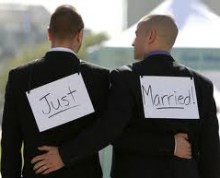By John Wagner, Published: August 18
Published from the Washington Post
In a single election this fall, Maryland voters will get the final say on whether gay couples may wed and illegal immigrants should pay in-state college tuition rates — two privileges that no other state has granted at the ballot box.
Voters, too, will decide whether to scrap the state’s new congressional map and — thanks to the legislature’s action Wednesday — whether to turn the Baltimore-Washington corridor into one of the most concentrated casino markets in the county.
At no time in memory have Maryland voters decided so many momentous cultural and economic issues on a single day. But not everyone is convinced that’s a good thing.
“Any one of these would be a high-profile issue in any other year,” said Mike Morrill, a veteran Democratic strategist. “With all four on the ballot, you run the risk that people won’t take the time to learn about them. Whatever simplistic notions cut through the clutter could dominate.”
Multiple messages
Already, some advocates for same sex-marriage and the “Dream Act” for undocumented students are concerned that a well-funded gambling campaign could make it harder for them to get their message out.
“One of the things I’m certainly worried about is the competition for attention,” said Travis Tazelaar, campaign manager for Educating Maryland Kids, a pro-Dream Act group.
Both of those defining social issues, which Gov. Martin O’Malley (D) is pushing, could have national implications. And the outcome of the gambling debate has far-reaching ramifications for the state and for Prince George’s County in particular.
An advertised $800 million casino that the ballot measure would allow in Prince George’s by 2016 would be the largest economic-development project in the pipeline for the county and could, quite literally, change the face of the region.
If the casino winds up at National Harbor, the most likely site, it would be among the first things motorists would see when crossing into Maryland on the Woodrow Wilson Bridge.
Lawmakers have mixed feelings about having so much on the ballot in November — the greater say the people have, the better, some argue — but most everyone agrees on this:
For a year in which there will be few competitive races between candidates in liberal-leaning Maryland, voters can expect to see an unprecedented number of issue ads on television and may find their mailboxes overflowing.
The four major issues have taken different paths to the ballot. Lawmakers chose to put gambling before voters. The other three are recently passed laws that were petitioned there by opponents, who have used the Internet to make signature-gathering far more efficient than in the past.
Besides those issues, Maryland voters will also be presented with three statewide questions — two related to the qualifications for Orphans’ Court judges and the third affecting when elected officials convicted of crimes must leave office. The latter was inspired by Leslie Johnson’s decision to remain on the Prince George’s County Council before she was sentenced in a widespread corruption scandal.
‘Asking a lot’ from voters
Voters in local jurisdictions will face additional measures. In Montgomery County, they’ll decide whether to repeal a law curtailing collective-bargaining rights for the local police union and whether to create a hiring authority for people with disabilities.
“This certainly, in my years in Maryland, is unprecedented,” Lt. Gov. Anthony G. Brown (D) said. “We’re asking a lot of voters.”
The busy ballot in Maryland could be most noticeable in Prince George’s, which is expected to be ground zero in the fight over the just-passed expanded gambling plan put forth by O’Malley.
The new law invites bids for a sixth Maryland casino from a swath of Prince George’s that includes both National Harbor and Rosecroft Raceway. It would also permit the state’s five previously authorized slots venues to offer Las Vegas-style table games, such as blackjack and roulette.
The entire expansion will take effect if a majority of voters statewide support the ballot measure. But a Prince George’s casino faces an additional hurdle: It will move forward only if a majority of those casting votes from the county support the plan.
Gambling companies and other special interests are expected to spend millions to help voters make up their minds.
TV viewers in Maryland have already gotten a taste of what’s to come. Those who watched the Summer Olympics on Baltimore television were treated to a nightly spectacle: dueling pitches during commercial breaks from both supporters and opponents of a casino at National Harbor.
Such ads were less frequent in the Washington market, where rates are more expensive, but they are likely to pick up in the fall.
“I would imagine we’re going to keep the same level of investment to help people understand why this is a good thing,” said Vance Ayres of the Washington DC Building Trades Council, a labor group that was heavily involved in the pro-National Harbor advertising campaign.
The Rev. Jonathan L. Weaver, pastor of Greater Mount Nebo African Methodist Episcopal Church in Bowie, said religious leaders are more determined than ever to halt the march of gambling.
“We’ve been fighting this battle for years, and I think the faith community in Prince George’s has never felt more galvanized,” he said.
Weaver said that he plans to speak out against the expanded gambling plan from the pulpit and that church leaders are prepared to fire off e-mails, send out fliers, work with civic associations and drive people to the polls.
If the ballot measure passes, Maryland could have three large casinos along a 44-mile stretch of Route 295.
Battle for attention
Some proponents of same-sex marriage in Maryland have watched nervously as the gambling issue played out in recent weeks, dominating news media coverage.
Same-sex marriage is legal in six states and the District. In all of those jurisdictions, legalization came through legislative action or a court ruling.
Maryland is among three states this fall where voters could authorize gay nuptials. They’ll be asked whether to uphold a law signed by O’Malley in March and swiftly petitioned to the ballot.
As the gambling debate unfolded in the legislature, the National Gay and Lesbian Task Force coordinated a mailer to Maryland Democrats, urging legislative defeat of O’Malley’s gambling plan. The group later explained that “an uncluttered ballot provides the best chance for securing marriage equality this November.”
Marylanders for Marriage Equality, the group leading the campaign for the ballot measure, has downplayed that concern. A memo from the group’s pollster said that given it is a presidential year, gambling is unlikely to attract many voters who would not show up at the polls otherwise.
Last year, Maryland became the 12th state to pass a law granting in-state college tuition rates to illegal immigrants’ children. To qualify under Maryland’s Dream Act, a student must graduate from a state high school and his or her family must file state tax returns.
The measure was petitioned to the ballot by conservative activists, who say it rewards illegal activity and costs the state. This fall will be the first time any state has held a public vote on the idea.
Some campaigns are already thinking they may have to get more creative if well-funded casino backers dominate the airways.
“Gambling is going to bring more money to the table than anything else,” said Tazelaar, who’s working to pass the Dream Act. “But there are many modes of communicating outside of TV. It’s going to be the Web and mail and phone calls and field [activities].”
Also competing for attention will be a ballot measure on whether to keep Maryland’s new congressional map. Last month, election officials announced that a Republican-led petition drive narrowly passed the threshold of nearly 56,000 signatures needed to put the issue on the ballot.
Opponents have argued that the map, which was proposed by O’Malley and approved by the Democrat-led legislature, goes too far in breaking up communities and groups of people so that Democrats can maximize their power.
If voters overturn the map, the legislature will have to go back to the drawing board, but there is no guarantee they won’t produce something similar.
Victor Zapana contributed to this report.


Socialize with Us: